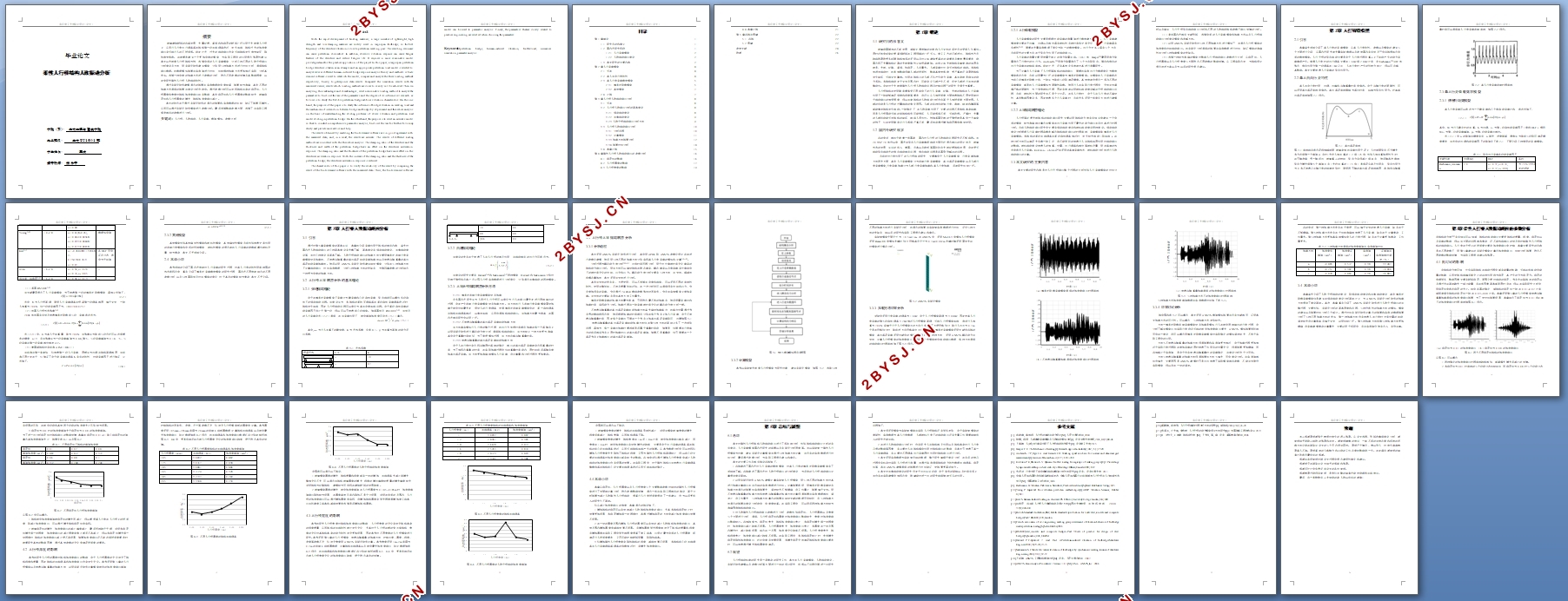柔性人行桥结构人致振动分析
无需注册登录,支付后按照提示操作即可获取该资料.
柔性人行桥结构人致振动分析(任务书,开题报告,外文翻译,论文12300字)
摘要
随着建筑材料的迅猛发展,大量轻质、高强和低阻尼的材料广泛应用于大跨度人行桥上,从而行人行走步行频率落在结构第一阶自振频率附近,发生共振,结构过大的加速度响应会引起行人的不舒适感。除此之外,过大的振动响应也会引起结构发生疲劳破环,降低疲劳寿命。这就要求建立一个更加合理的模型,为实际工程中的应用提出指导性建议.本文以大跨度人行桥结构为例,选择合适的人行荷载模型,分析几种不同的人致天桥响应分析理论及方法,用有限元软件建立模型,分别用三种加载方式进行对比分析,得到结构响应数据。将数据模拟结果与实测值进行对比,比较哪种加载方式更加接近实际,分析其优劣。选择一种合理的加载方式进行参数的分析,找出不用参数的规律及其影响程度,以此来研究柔性人行桥人致振动特性。
通过有限元软件建模得出的结果与实测数据吻合度较高,结果较为准确,其中不同的加载方式得到的结果与理论分析也吻合。通过参数分析可以发现结构自身的阻尼比、人行桥厚度和宽度对结构加速度响应均有影响,其中阻尼比和人行桥厚度的影响较大,随着阻尼比和人行桥厚度的增大,结构加速度响应减小。
本文的特色在于通过有限元软件的得出的结果和实测数据的比较,验证了结果可靠性。从而可以通过有限元软件模型进行参数分析。最后选择影响参数方面,选择了与实际工程紧密相关的参数进行分析。
关键词:人行桥;人致振动;人行荷载;数值模拟;参数分析
Abstract
With the rapid development of building materials, a large number of lightweight, high strength and low damping materials are widely used in large-span footbridge, so the first frequency of the structure vibrationis close to pedestrian walking pace. The resulting resonance can cause pedestrian discomfort. In addition, excessive vibration response can cause fatigue fracture of the structure and reduce fatigue life. It requires a more reasonable model provideguidancefor the practical application of the project.In this paper, a large-span pedestrian bridge structure is taken as an example and an appropriate pedestrian load model is selected to analyze several different human-induced bridge response analysis theory and methods. A finite element software is used to establish the model, compare and analyze the three loading methods respectively, finally, to getresponse data results. Compared the simulation results with the measured values, results which loading methods are closer to reality will be achieved.Then via analyzing their advantages and disadvantages., select a reasonable loading method to analyze the parameters to find out the law of the parameters and the degree of its influence.All research as follows is to study the flexible pedestrian bridge artificial vibration characteristics. On the one hand, the purpose of this paper is to study the influence of bridge vibration on walking load and the mechanism of interaction between bridge and bridge by experiment and theoretical analysis on the basis of understanding the existing problems of excess vibration and pedestrian load model existing in pedestrian bridge. On the other hand, the purpose is to select an accurate model so that to conduct a comprehensive parametric analysis, find out the law for further follow-up study and provide more advice and help.
The results obtained by modeling the finite element software are in good agreement with the measured data, and, in a word, the results are accurate. The results of different loading methods are consistent with the theoretical analysis. The damping ratio of the structure and the thickness and width of the pedestrian bridge have an effect on the structural acceleration response. The damping ratio and the thickness of the pedestrian bridge have more effect on the structural acceleration response. With the increase of the damping ratio and the thickness of the pedestrian bridge, the structural acceleration response is reduced.
The characteristic of this paper is to verify the reliability of the result by comparing the result of the finite element software with the measured data. Thus, the finite element software model can be used to parametric analysis. Finally, the parameters thatare closely related to practical engineering are selected when choosing the parameters.
Keywords:pedestrian bridge; human-induced vibration; footfallload; numerical simulation;parameter analysis

目录
第1章绪论 1
1.1 研究目的和意义 1
1.2 国内外研究现状 1
1.2.1 人行荷载模型 2
1.2.2 人致振动响应理论 2
1.3 本文研究的主要内容 2
第2章人行荷载模型 4
2.1 引言 4
2.2 单人自由行走特性 4
2.3 单人行走荷载数学模型 5
2.3.1 傅里叶级数模型 5
2.3.2 其他模型 7
2.4 小结 7
第3章人行桥人致振动响应分析 8
3.1 引言 8
3.2 人行桥人致响应分析的基本理论 8
3.2.1 强迫振动理论 8
3.2.2 自激振动理论 9
3.2.3人致天桥振动响应分析方法 9
3.3 人行桥人致振动响应分析 10
3.3.1 分析流程 10
3.3.2 计算模型 11
3.3.3加载方法结果分析 12
3.3.4结果对比分析 14
3.4 本章小结 15
第4章柔性人行桥人致振动响应的参数分析 16
4.1 阻尼比的影响 16
4.2 人行桥厚度的影响 17
4.3人行桥宽度的影响 19
4.4本章小结 21
第5章总结与展望 22
5.1 总结 22
5.2展望 22
参考文献 24
致谢 26
